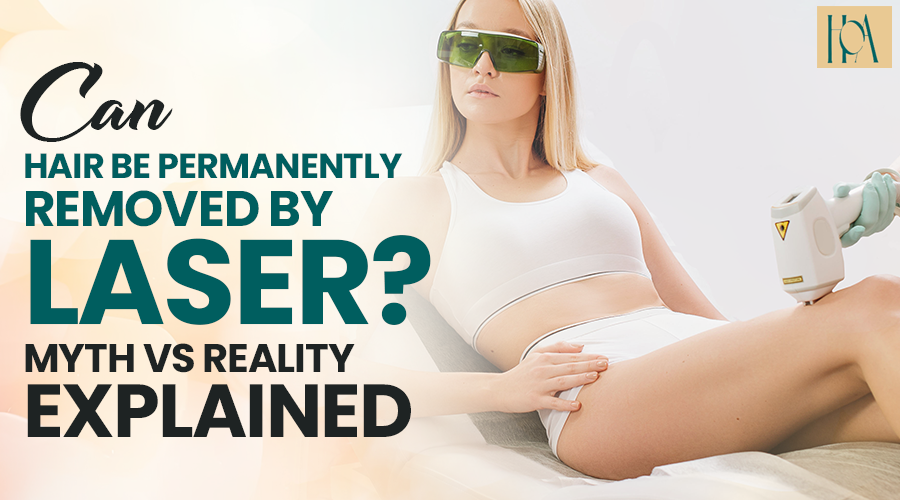Unwanted body hair is a common concern faced by individuals of all genders and age groups. While temporary solutions like waxing, shaving, and depilatory creams have long been popular, their short-lived results often lead to frustration. At HOA, under the expert guidance of Dr. Neha Khurana, laser hair removal has emerged as a safe, effective, and long-term solution. Using advanced laser technologies, this dermatologist-recommended procedure is gaining popularity for its ability to reduce hair growth significantly over time.
Many people often ask, “Can hair be permanently removed by laser?” Its promise of ‘permanent’ hair reduction or long-term freedom from hair sparks curiosity. To understand the reality of LHR, let’s explore key facts and see whether it’s just another beauty trend or a truly effective solution.
Can Hair Be Permanently Removed by Laser Using Modern Technologies?
With advancements in dermatological science, laser hair removal has evolved significantly over the years. At HOA, under the expert care of Dr. Neha Khurana, cutting-edge technologies like Diode, Alexandrite, and Nd: YAG lasers are used to deliver safe, precise, and long-lasting hair reduction for various skin tones and hair types. But the big question remains—can hair be permanently removed by laser using these technologies? While the results can be impressive, it’s important to understand what “permanent” truly means and the factors that influence long-term success.
Laser hair removal
Laser hair removal, one of the most proficient hair reduction procedures, is a non-invasive procedure that uses concentrated light beams to target the melanin pigment of the hair follicles. The heat energy basically damages the hair follicles and prevents any future growth.
However, since hair grows in cycles (anagen, catagen, telogen), the laser only works effectively on hairs in the anagen (active growth) phase. This is why multiple sessions are needed, typically spaced 4–6 weeks apart.
Also Read:- Can Hair Be Permanently Removed by Laser
Is laser hair removal a magic wand for permanent hair loss? Exploring myth vs fact
Many people often ask, “Can hair be permanently removed by laser?” This promise of ‘permanent’ hair reduction sparks curiosity…
The myth – “Laser hair removal gives permanent results—you’ll never have to worry about hair again!”
The real side –
Laser hair removal offers permanent hair reduction, not removal. You may never be 100% hair-free, but you’ll experience a significant reduction in both the quantity and thickness of the hair.
Some hair follicles are only damaged (not destroyed) and may regenerate over time. Also, hormonal changes (like pregnancy or PCOS) can cause hair regrowth even after successful treatment.
So yes, lasers can give long-lasting results, but not complete, guaranteed forever hairlessness.
Factors affecting permanent results
Several factors influence how permanent your results will be:
- Skin Tone & Hair Color: The ideal combination is light skin with dark hair, but newer laser technologies (like Nd: YAG) can safely treat darker skin types.
- Hair Thickness: Coarser, darker hair responds better than fine, light-colored hair (like peach fuzz or gray hairs).
- Hormones: Conditions like PCOS, menopause, or pregnancy can trigger hair regrowth even after successful treatment.
- Treatment Area: The effectiveness of the laser depends upon the hair density, and thus areas of dense hair growth show better results, such as underarms, bikini area, etc.
- Type of Laser Used: Diode, Alexandrite, and Nd: YAG lasers all vary in how deeply they penetrate and how well they target different skin tones.
- Number of Sessions: Optimal results require 6-8 sessions. Some may need more.
Does a laser destroy hair follicles completely?
So, while many wonder “can hair be permanently removed by laser,” the truth is that it typically puts follicles in a long-term dormant state, rather than destroying them entirely.
Laser targets and damages the hair follicle enough to prevent future growth, but it doesn’t always destroy it permanently. Think of it as putting the follicle into a long-term “sleep mode.” Some follicles may remain dormant for months or years, then reactivate, especially under hormonal influence.
Permanent destruction of hair follicles is more commonly associated with electrolysis (we’ll discuss this in a moment).
Also Read:- Affordable laser treatment for facial hair removal cost
Comparison between laser hair removal and electrolysis
When it comes to long-term hair removal, laser hair removal (LHR) and electrolysis are the two most popular methods, but they work quite differently. Laser hair removal uses concentrated light to target the pigment (melanin) in hair follicles. This light is absorbed, converted into heat, and damages the follicle, resulting in long-term hair reduction. It’s ideal for larger areas like the legs, back, and underarms, and works best on people with light skin and dark hair. It’s relatively quick and causes minimal discomfort—most describe it as feeling like a rubber band snap. However, it doesn’t work as well on very light, red, gray, or fine hair due to low melanin content.
Electrolysis, on the other hand, uses a fine probe inserted into each hair follicle to deliver a tiny electric current that permanently destroys the follicle. Unlike laser, electrolysis targets the follicle directly rather than relying on pigment, which means it can treat all skin tones and hair colors, including blonde and gray. In fact, electrolysis is the only FDA-approved method for permanent hair removal, while laser is FDA-approved for permanent hair reduction. This distinction often leads people to ask, “Can hair be permanently removed by laser?” The answer is: lasers can offer significant and lasting results, but not complete, forever hair removal like electrolysis.
In summary, laser is faster and more convenient for large areas with dark hair, while electrolysis is better for small, stubborn areas and lighter hair colors where precision and permanency are a priority.
Maintenance sessions post laser hair removal
Yes. Even after a full cycle, annual or biannual touch-ups are often needed to maintain results. Hormonal changes, stress, or even medications can reactivate dormant follicles.
Touch-ups are usually quick, require fewer pulses, and may only be necessary for specific areas where regrowth occurs.
Also Read:- How Long will HydraFacial Results Last? | Skincare Insights
Is laser hair removal permanent for everyone?
Unfortunately, no. Laser results can vary dramatically depending on:
- Genetics
- Hormonal profile
- Consistency in the treatment schedule
- Choice of clinic or device
Depending upon the hair colour, certain shades show little to no effect, such as light blonde, red, or gray. This is because of the lower melanin content in these shades.
Also, for people with PCOS, facial hair may require ongoing sessions or a combination of laser and medical treatment to manage regrowth.
Conclusion
Laser hair removal isn’t a miracle, but when done right, it can offer a long-term solution for managing unwanted hair. At HOA, Dr. Neha Khurana combines modern laser technology with personalized care to ensure optimal results for each patient. While it may not eliminate every single hair forever, the freedom from constant shaving or waxing—and the confidence that comes with smoother skin—makes it a worthwhile investment in your skincare journey.
Just keep in mind that it is not a miracle solution and you will need to be patient, consistent, and maintain aftercare skincare for optimum results.
FAQs
Is laser hair removal painful?
It feels like a rubber band snapping against the skin. Newer machines come with cooling tips to reduce discomfort.
Is it suitable to get laser hair removal done during pregnancy?
Most dermatologists advise against it as there’s limited safety data for pregnancy.
What is the average number of sessions needed?
Usually, 6–8 sessions are needed, but it depends on the body area, hair thickness, and individual hair growth cycles.
Does it cost a lot?
Upfront costs are higher than waxing or shaving, but over time, it can actually be more economical.
Is laser hair removal gender specific?
Absolutely. Men often get it for chest, back, beard shaping, and neck areas.
Is facial laser safe?
Yes, but areas like upper lip, chin, or sideburns need special attention due to hormonal hair growth patterns.





